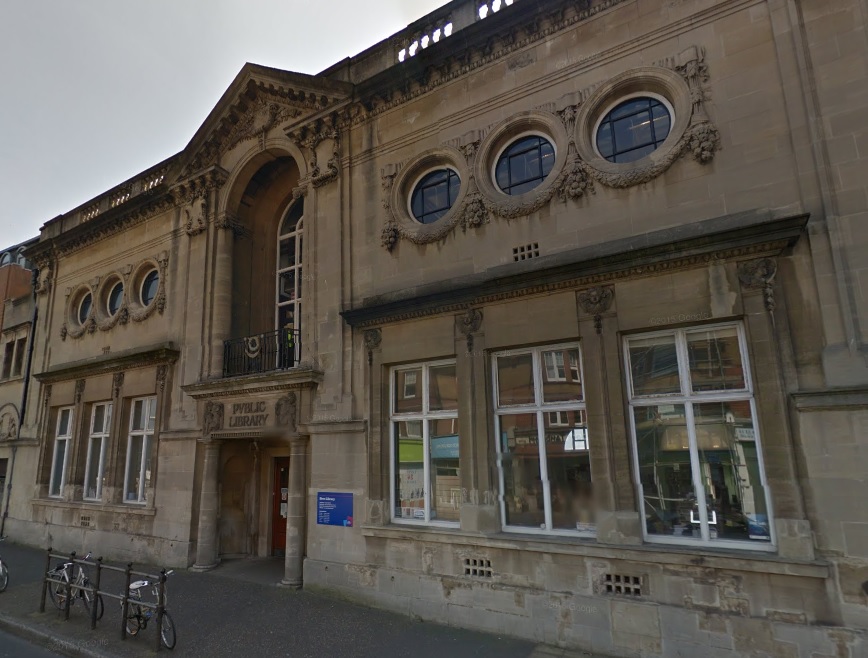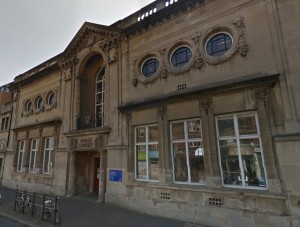Hove Library is a step closer to leaving the Carnegie building in Church Road after a vote by councillors this afternoon (Thursday 10 March).
A final decision is due to be taken in a fortnight at a meeting of Brighton and Hove City Council.
Under the council’s Libraries Plan 2016-20 Hove Library will move from its existing 108-year-old premises to the Brooker Hall, home of Hove Museum.
The council plans to create more space inside and outside the building for library users and to have some flexible shared spaces with the museum.
The proposal has attracted opposition including from former Green councillor Christopher Hawtree who campaigned against a previous proposal to close the Carnegie building.
Councillor Robert Nemeth led the opposition to the proposal at the council’s Economic Development and Culture Committee meeting yesterday (Thursday 10 March) which took place in the Jubilee Library in Brighton.
Councillor Nemeth said: “I am disappointed that the important question of Hove Library’s future is being dealt with as part of a wider package of measures when it could easily have been taken out and dealt with in isolation.
“Considering the future of Hove Library in this manner divides and rules and detracts from a lot of good work that has been done in other areas such as Hollingbury and Westdene.

“But this is counting the so-called flexible museum/library areas. Dedicated library space in the new facility is only around 250m2 – a reduction of some 59 per cent. Nowhere near the 15 per cent figure.
“If the flexible space is to be counted as library space, as has been done, then it needs to be acknowledged that the museum is to shrink by an equivalent amount.
“To not do so would be double-counting – in effect, a gross manipulation of the figures.
“250m2 is to be lost from the museum – essentially the whole ground floor of a two-storey museum – or half the museum.
“This is quite an important detail to skip over.
“So whether it’s the shrinking library or a vanishing museum, there is no doubt that Hove is losing out again.
“And there is of course the removal of much of the garden behind the museum – one of Westbourne Ward’s only green spaces.
“The building condition report suggests that repairs will cost £845,000 over the coming five years.
“I would question this figure but would also point out that, if it is true, any potential purchaser will expect the asking price to take it into account.

“In conclusion, having assured thousands of residents on the doorstep in the run-up to the election that I would resist further damage to Hove as a distinct community, I couldn’t possibly support a policy that sees such a reduction in service for the town.”
Councillor Alan Robins said: “This report is nothing short of miraculous.”
He said that despite budget cuts, the Libraries Plan included creative ideas for a better service and longer opening hours across the 14 libraries in Brighton and Hove.
Councillor Robins said: “We’ve got to look at this in the round. We’ve had no other suggestions. No one’s said leave Hove Library and pay for it by doing this or not doing that.
“The campaign that’s been run has been disingenuous. They’ve been telling people they’re going to shut Hove Library without telling them we’re going to move it 400 yards down the road.
“The old Goldstone football ground was a much-loved football ground but it was rubbish … The new ground is lovely.
“The hospital out in Kemp Town is a lovely building. It’s old and it’s precious but nobody’s saying we shouldn’t knock it down and build a modern replacement.”
Councillor Garry Peltzer Dunn pointed out that Brooker Hall – which was used for German prisoners of war during the First World War – was 30 years older than the Carnegie building. It was built in 1877.

He said that while he was not happy with some of the aspects of the report before the committee, it also contained many good things.
And he was mindful that while councillors represent a ward they also had a wider duty to the council as a whole.
Councillor Les Hamilton said: “When I first moved to Mile Oak the library was in a small room in a community building. Then it moved into Portslade School and Community College and now it’s in PACA.
“It’s been in three buildings but it’s always been Mile Oak Library. It’s a service – not a building.”
Council leader Warren Morgan said: “I have huge respect for everyone who’s campaigned to protect the Carnegie building. It’s obviously a much-loved building.”
He cited his Labour colleague, Councillor Dan Yates, who pointed out that the council was under a duty to provide a library service for the whole area.
The committee had been told five to seven libraries might have to shut if Hove Library stayed in the Carnegie building. It is expected to open in the museum building in early 2018.
Councillor Morgan said that the Libraries Plan would lead to extended opening hours across the city.
And he added: “We will always put services before buildings.”
The Economic Development and Culture Committee voted 6-3 in favour of the Libraries Plan, which includes moving Hove Library, with one abstention.
The final decision will be taken at a meeting of the full council on Thursday 24 March at Brighton Town Hall. The meeting is open to the public.










Green Cllr Tom Druitt made an interesting suggestion in this debate ahead of decision. He felt there was a case to be made for taking some of the anticipated Capital Receipts from the sale of Kings House for claimed repairs need to the Carnegie Hove Library building.
This idea was dismissed by the Labour group.
The city of Brighton & Hove is not rich in significant civic buildings and, like it or not, reputations are built on such things. London and elsewhere have elevated status in large part because ofthem…museums, libraries (national and local), palaces, universities.
Would anyone notice Cambridge without its ancient university buildings? Or Oxford? They are world-renowned. It is the depth of visible history encapsulated in substantial buildings that go on and on which gives an area its gravitas. When children live where none such exists, how are they to learn to appreciate heritage architecture as belonging and having a role in the fabric of their towns and cities?
What do we have? The Royal Pavilion and maybe Bartholomew Square’s Town Hall along with the Carnegie Library in Hove. We have lots of listed buildings, but not lots of notable, listed civic institutions.
The 1877 Brooker Hall (a house after all, converted to museum use – with forced, difficult to access poky rooms upstairs)cannot be without repair and maintenance needs of its own. What are they now and what are they projected to be in years to come compared to what is claimed the cost of Hove Library will be.
Labour tried to get rid of the Carnegie building when last in power and they lied that it could not be made DDA compliant. We got a lift and the building was not lost – they wanted it for the Black and Minority Ethnic Forum to have for a headquarters, along with the £1m of funding from Govt that would have attracted.
I just cannot believe there is not an ulterior motive driving their seeming cultural-revolution style move to rid the city of this heritage asset. The next move would be to close down Brooker Hall eventually as sure as night follows day. There is already a Trust being formed to offload the museum service to. And that would then terminate the library service in old Hove, which is what I suspect is the end game.
It is my understanding that the Hove Library was left to the people of Hove. The council does not have the right to sell it off , especially for a pittance to one of their mates.
We need to be probing just how much the Jubilee Library is now responsible for the downgrading of library facilities elsewhere. It was built using PFI money and is stocked under the PFI. What is the annual amount paid over to the PFI handlers for it I wonder and for how many years to come?
Can the city afford to KEEP the Jubilee? As a building it would generate a staggeringly high Capital Receipt if sold – assuming the City owns it. Does the PFI bleeding the coffers own it or BHCC?
I asked a Public Question whose Supplementary was about the PFI. Councillor Morgan said that he had no idea about this. A month later I got a written reply, written by Sally McMahon, and it said nothing. the increase in PFI and the attached, ring-fencecd Book Fund are due for renegotiation. This isn a factor behind the threat to close down the Carnegie.